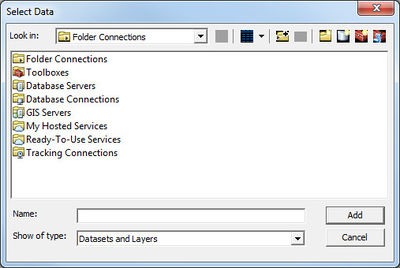WMS:ArcObjects Add Data: Difference between revisions
From XMS Wiki
Jump to navigationJump to search
No edit summary |
|||
| (10 intermediate revisions by the same user not shown) | |||
| Line 1: | Line 1: | ||
The '''Add Data''' command is available when | The '''Add Data''' command is available when ArcObjects® is enabled and uses the same dialog resource to open GIS data layers that is used by ArcGIS®. | ||
[[ | [[File:Add Data Dialog.jpg|400 px]] | ||
When | When ArcObjects® is enabled, it is possible to load any of the ESRI supported formats, including shapefiles, coverages, geodatabases, grids, images, CAD files and other formats, as GIS data layers in WMS. These data can then be converted to WMS feature objects in map coverages. | ||
==Related Topics== | ==Related Topics== | ||
* [[WMS:Enabling ArcObjects|Enabling ArcObjects]] | * [[WMS:Introduction to ArcObjects#Enabling ArcObjects|Enabling ArcObjects]] | ||
* [[WMS:Mapping to Feature Objects|Mapping GIS Features to Feature Objects]] | * [[WMS:Mapping to Feature Objects|Mapping GIS Features to Feature Objects]] | ||
* [[WMS:Add Shapefile Data|Adding Shapefile Data]] | * [[WMS:Add Shapefile Data|Adding Shapefile Data]] | ||
| Line 13: | Line 13: | ||
{{WMSMain}} | {{WMSMain}} | ||
[[Category:WMS GIS|A]] | |||
[[Category:WMS GIS Dialogs]] | |||
{{stub}} | |||
Latest revision as of 15:42, 2 February 2016
The Add Data command is available when ArcObjects® is enabled and uses the same dialog resource to open GIS data layers that is used by ArcGIS®.
When ArcObjects® is enabled, it is possible to load any of the ESRI supported formats, including shapefiles, coverages, geodatabases, grids, images, CAD files and other formats, as GIS data layers in WMS. These data can then be converted to WMS feature objects in map coverages.
Related Topics
| [hide] WMS – Watershed Modeling System | ||
|---|---|---|
| Modules: | Terrain Data • Drainage • Map • Hydrologic Modeling • River • GIS • 2D Grid • 2D Scatter |  |
| Models: | CE-QUAL-W2 • GSSHA • HEC-1 • HEC-HMS • HEC-RAS • HSPF • MODRAT • NSS • OC Hydrograph • OC Rational • Rational • River Tools • Storm Drain • SMPDBK • SWMM • TR-20 • TR-55 | |
| Toolbars: | Modules • Macros • Units • Digitize • Static Tools • Dynamic Tools • Drawing • Get Data Tools | |
| Aquaveo | ||
